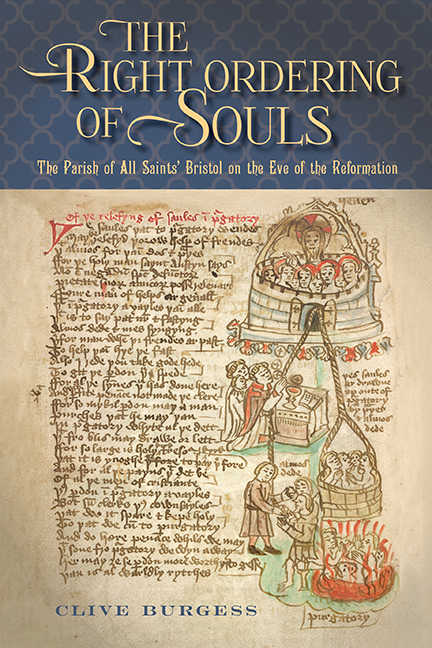Book contents
- Frontmatter
- Dedication
- Contents
- List of illustrations
- Acknowledgements
- Miscellaneous Frontmatter
- Abbreviations
- Notes
- map
- Part I For the increase of the divine service
- Part II All Saints’, Bristol, and its parishioners
- 2 ‘To be showed and declared’: Circumstances and sources
- 3 ‘According to the usage there’: Reading testamentary evidence
- 4 ‘Since his decease’: The widows’ might
- 5 ‘God amend them’: The parish wronged
- Part III Commemorating the dead
- Part IV Leaders and administrators
- Part V Ordering the parish
- Appendices
- Bibliography
- Glossary
- Index
- Miscellaneous Endmatter
2 - ‘To be showed and declared’: Circumstances and sources
from Part II - All Saints’, Bristol, and its parishioners
Published online by Cambridge University Press: 05 May 2018
- Frontmatter
- Dedication
- Contents
- List of illustrations
- Acknowledgements
- Miscellaneous Frontmatter
- Abbreviations
- Notes
- map
- Part I For the increase of the divine service
- Part II All Saints’, Bristol, and its parishioners
- 2 ‘To be showed and declared’: Circumstances and sources
- 3 ‘According to the usage there’: Reading testamentary evidence
- 4 ‘Since his decease’: The widows’ might
- 5 ‘God amend them’: The parish wronged
- Part III Commemorating the dead
- Part IV Leaders and administrators
- Part V Ordering the parish
- Appendices
- Bibliography
- Glossary
- Index
- Miscellaneous Endmatter
Summary
‘Almost the richest city’: Bristol and its environment in the late Middle Ages
AS a provincial centre, Bristol was unorthodox: it had not developed on a Roman settlement, nor was it an ecclesiastical centre – its situation on the southern edge of the Worcester diocese meant that, with the growth of the suburbs of Temple and Redcliffe, the town also extended into the northern periphery of the diocese of Bath and Wells. Bristol had owed its origins, in the tenth century, to its suitability for trade with Ireland, then enriched by Viking endeavour; having gained a commercial rationale, strategic factors worked to its advantage. The original burh occupied a rocky mound, some twenty acres in extent, almost encircled by the waters of the Rivers Avon and Frome. Land access was only possible from the east, via an isthmus defended by a keep strengthened immediately after the Conquest. The quays sited at the confluence of these rivers, mainly to the west of the burh, were also notably secure, given that approach was possible only through the easily defensible channel of the Avon Gorge. But Bristol's position a short distance from the confluence of the Avon and Severn afforded access not only to river systems serving the Marches and the English midlands but also the open sea and, thus, to south-western England, south Wales and Ireland, and also the Bay of Biscay. In addition, Bristol benefited from a hinterland rich in agricultural, mineral and, in time, manufactured product. As well as easily profiting from exchange by river and sea, the local road system – especially the old Roman road between Bath and the Severn that ran through the suburbs of the town – facilitated access to centres such as Gloucester, Cirencester, Oxford and, thence, London.
Bristol's significance in the post-Conquest period was exploited by a series of magnates, most notably, in the twelfth century, Robert of Gloucester, the bastard son of Henry I and half-brother to the Empress Matilda. He strengthened Bristol castle, which became his principal residence and, in the civil war of the midtwelfth century, Robert championed his half-sister's cause against King Stephen.
- Type
- Chapter
- Information
- 'The Right Ordering of Souls'The Parish of All Saints’ Bristol on the Eve of the Reformation, pp. 59 - 82Publisher: Boydell & BrewerPrint publication year: 2018

